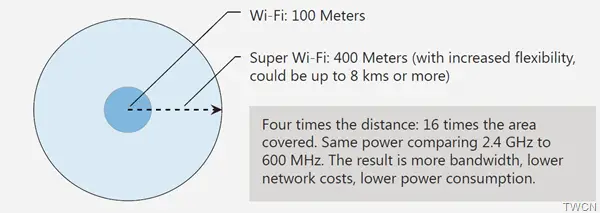Aiming to widen internet reach in rural India, Microsoft India is planning to provide free internet using White Space technology. Microsoft wants to take last mile internet connectivity to remote parts of India. For this, Microsoft has proposed the telecom department of Indian Government to deploy its TV White Space technology for a pilot project in Bangalore.

White Space is the unused spectrum between 2 TV channels and Microsoft wants to use this to provide free connectivity to remote areas in India.
“Wifi has a range of only about 100 metres, whereas the 200-300 MHz spectrum band available in the white space can reach up to 10 km,” said Bhaskar Pramanik, chairman, Microsoft India. “This spectrum belongs mainly to Doordarshan and the government and is not used at all. We have sought clearance for a pilot project in two districts.”
TV white spaces are the unused TV channels that could be used to deliver broadband access, services, and applications. TV white spaces devices and networks will work in much the same way as conventional Wi-Fi, but because the TV signals travel over longer distances and better penetrate walls and other obstacles, they require fewer access points to cover the same area. These excellent range and obstacle penetration characteristics explain why people increasingly refer to TV white spaces as “Super Wi-Fi.”
For more details on White Space technology, please check Microsoft Research’s Spectrum Technology
If the Microsoft India’s pilots are successful, it plans to roll out the project across India giving a big boost to Government of India’s Digital India initiative. The Government had proposed to use technology in much bigger way to deliver governance to every Indian citizen even in remotest places.
Digital India project envisages to provide broadband connectivity across India connecting 250000 gram panchayats via optic fiber cables, providing digital infrastructure to every citizen, digital governance and services on demand to all citizens.
“The challenge is the lack of digital infrastructure across India. This initiative addresses this challenge in a cost-effective manner and creates an eco-system that will benefit everyone, including manufacturers of routers and other technology devices, other technology companies, besides Microsoft,” Pramanik said.
Though the technology hasn’t been widely adopted anywhere in the world but the technology is believed to provide spurt in broadband connectivity in countries like India. Engineers at Microsoft development Centers in India have adapted this unlicenced technology for this country.
Hope to see the pilot project succeed so that the technology can be adopted countrywide and other countries too can follow if their needs get fulfilled by this.
Leave a Reply